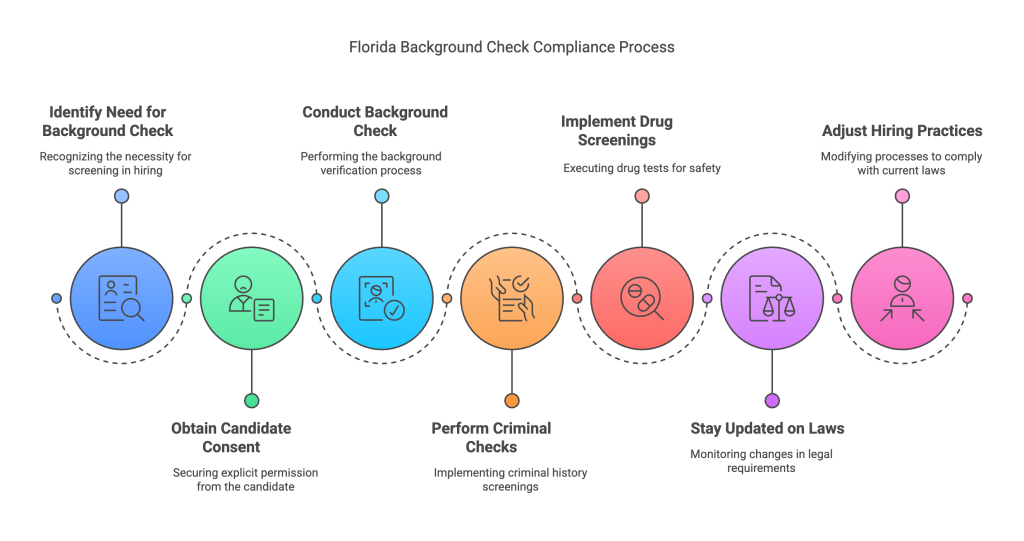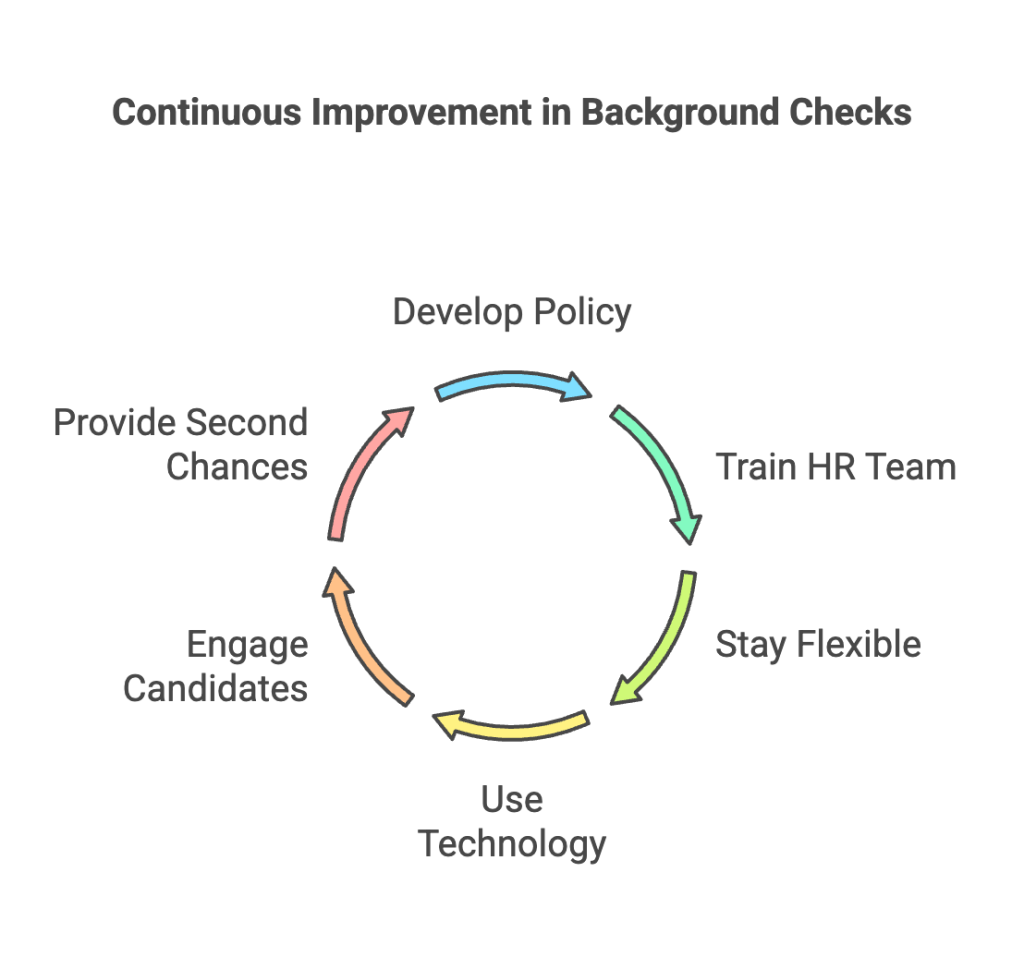Florida's sun-kissed landscapes and bustling tourist spots make it a prime location for seasonal work, especially in industries like tourism and agriculture. However, hiring seasonal workers comes with its unique set of challenges, one of which is compliance with Florida’s background check laws. This article delves into how these laws affect seasonal workers, offering a comprehensive, evidence-based view on how businesses can navigate these regulations successfully.
Key Takeaways
- Florida's tourism and agriculture sectors rely heavily on seasonal workers, creating a demand for efficient hiring while adhering to strict background check laws.
- Understanding and complying with Florida's background check laws, including obtaining consent and making clear disclosures, is vital for legal hiring practices.
- Leveraging technology such as AI can streamline background checks, enabling faster hiring without sacrificing compliance or safety.
- Conducting fair background checks involves balancing safety with providing opportunities, ensuring past minor offenses don't unjustly limit employment prospects.
- Regular updates to your hiring practices and staying informed about changes in laws and technology help maintain compliance and protect your business integrity.
Introduction
Every year, Florida's tourism and agriculture industries scramble to find the right people to keep the wheels turning during peak seasons. The demand for seasonal workers surges, requiring businesses to hire quickly and efficiently. But this rush brings challenges.
Meeting Florida's background check laws becomes crucial. Companies must navigate regulations to ensure they hire safely and legally, balancing speed with compliance. The clear understanding of these laws can prevent costly mistakes and protect workplace integrity.
So, how do these laws affect seasonal hiring? And what steps can businesses take to stay on the right side of the law? Through data and practical insights, this article sheds light on conducting background checks that satisfy legal requirements while supporting your business goals. As we break down the elements at play, you'll find informed approaches to hiring that align with both legal and social expectations.
The Landscape of Seasonal Work in Florida
Florida thrives on its seasonal economy. Tourism and agriculture lead the charge, offering numerous temporary job opportunities. Roughly 20% of Florida's workforce engages in seasonal employment each year, contributing billions to the state's economy. Visitors flood the beaches and theme parks, driving demand for short-term workers. Citrus farms also become hotspots for temporary hires during harvest seasons.
For employers, hiring seasonal workers brings unique challenges. Ensuring compliance with state background check laws is essential. This isn't just about legality; it's about sustaining safe and reliable business operations. When your workforce directly interacts with the public, like in tourism, or handles sensitive tasks, like in agriculture, background checks become vital.
Consider a theme park hiring thousands of temporary employees. Each new hire needs verification to protect both staff and visitors. It's not only about identifying obvious red flags; it’s ensuring each employee fits the role securely and responsibly to maintain public trust.
Addressing these needs requires understanding seasonal roles and their industry specifics. Implementing well-defined procedures helps bridge the gap between temporary hires and standard employees, ensuring public safety and maintaining the integrity of services offered.
Does your current approach meet these standards? Exploring and adapting compliant practices isn’t just necessary—it benefits both the business and the employee.
Understanding Florida's Background Check Laws

Florida has specific laws governing background checks that are crucial for any business considering seasonal hires. As an employer, understanding these regulations is the first step toward a compliant hiring process. In Florida, two key areas you need to focus on are consent and disclosure.
Before conducting a background check, you're legally required to obtain explicit consent from the candidate. This involves providing a clear disclosure that a background check will be conducted for employment purposes. It's important to present this information as a separate document, not bundled with other forms.
Criminal checks are a major component of background screening in Florida. When hiring for roles in tourism or agriculture, it’s common to run these checks to ensure safety and security in the workplace. However, there are limitations on what criminal history information can be considered. Florida law restricts the use of certain arrest records without convictions in making employment decisions.
You'll frequently encounter drug screening requirements alongside criminal checks. Particularly in agricultural roles, drug screenings help maintain a safe work environment. Make sure your processes align with Florida's drug testing laws, which could involve specific procedural steps like notice periods and sample handling.
Recent legislative changes in Florida have introduced shifts in background check protocols. For instance, there might be new rules about time limits on considering past criminal offenses. Keeping up with these updates can be challenging but staying informed is necessary to remain compliant.
Navigating these laws means constantly updating your practices. Regularly check for legislative updates and adjust your policies accordingly. Are your disclosure forms up to date? Do your procedures align with current legal standards? Continuous review can prevent legal pitfalls and streamline your seasonal hiring process.
Conducting Seasonal Worker Background Checks
Conducting background checks for seasonal workers requires precision and a clear understanding of legal requirements. You need to move quickly yet thoroughly to meet hiring demands. Here’s how you can do it effectively.
Streamlined Screening Process
Start by defining the scope of your background checks. Decide if you will only check criminal history, or if you also need to screen for drug use, credit history, or other factors. Match the checks to the job roles. For example, a cashier might require a credit check, while a role involving driving might necessitate a motor vehicle report.
Leveraging Technology
Use technology to expedite the process. Platforms that integrate AI can sift through vast data sets quickly, flagging potential issues more efficiently than manual reviews. Automated systems often provide faster turnaround times, an advantage during peak hiring seasons when businesses can’t afford delays.
Clear Communication and Consent
Always communicate with applicants about the checks you will perform. It’s not just ethical; it’s also a legal requirement in Florida. Obtain clear, written consent and explain how you will use the gathered information. Transparency builds trust and reduces the chances of disputes later.
Efficient Timeline Management
Timing is crucial. Begin background checks as soon as you have a shortlist of candidates. This proactive approach saves you from last-minute rushes and allows time to address any discrepancies or follow-ups needed. Set clear timelines and stick to them.
Data Security
Protect applicants’ information with robust data security measures. Comply with data protection laws to avoid breaches and build trust. Ensure that only authorized personnel have access to sensitive information, and regularly audit your data security practices.
Final Thoughts
By following these practices, you won’t just comply with Florida’s laws; you will create a more efficient and fair hiring process. Ask yourself: Are you prepared to harness the full potential of your seasonal workforce? The right background check process can be a crucial first step.
Social Implications of Background Checks
Background checks can be a double-edged sword for seasonal workers in Florida, especially migrants and temporary hires. On one hand, they protect workplace integrity and ensure safety. But on the other, they can sometimes create barriers to employment.
Imagine a scenario where a qualified candidate is denied employment because of a minor offense from years ago. This can deter individuals from pursuing jobs that could be a perfect match for their skills. Are you utilizing these checks to enhance your recruitment process or inadvertently excluding potential talent?
Migrant workers often face additional hurdles. Language barriers can complicate understanding consent forms and procedures. Cultural differences may mean applicants are unfamiliar with the disclosure norms expected in U.S. hiring practices.
Does your organization take into account these nuances to promote a fair hiring environment? Offering language support or clarifying procedures can make a significant difference.
Bias, though often unintentional, is another area of concern. Background checks might reflect biases against certain demographic groups. How do you ensure your processes are unbiased and focus on the applicant's potential and capabilities?
The goal for employers should be to balance safety with opportunity. Consider making exceptions for minor offenses or providing paths to appeal decisions that come from background screenings. By focusing on fair opportunity, you can foster a more inclusive workplace.
Does your company policy support these ideals? What steps are you taking to ensure equal opportunities for all candidates while maintaining necessary safety and compliance standards?
Case Studies and Real-World Examples
Tourism Jobs
Consider a bustling hotel in Orlando during peak tourist season. With a constant influx of visitors, the hotel needed to hire hundreds of seasonal employees quickly. The management decided to implement a streamlined background check process using an automated system. This approach trimmed down the time to complete checks from weeks to days. Despite the speed, they carefully adhered to the consent and disclosure requirements mandated by Florida law. This swift yet compliant screening allowed them to staff their hotel adequately while ensuring guest safety.
Yet, challenges persisted. For instance, some candidates, mostly international students, encountered delays due to international verification processes. By working with a background checking service that understood these nuances, the hotel navigated these hurdles without compromising compliance or candidate experience.
Agriculture Background Checks
In the expansive citrus fields of central Florida, a large farming corporation faced different challenges. With a significant portion of their workforce comprising migrant workers, they implemented additional checks focused on identity verification due to the complex nature of migrant documentation.
One year, they piloted a program using biometric identification to confirm worker identities quickly. This not only improved accuracy but also sped up the hiring process. Importantly, they remained transparent with candidates about the processes and their intention to uphold safety and trust.
Despite technological assistance, the company learned that legal changes could impact processes. For example, a minor adjustment in employment regulation required them to reassess their approach to handling certain data. By staying informed and adapting, they managed to keep operations compliant and retained a loyal seasonal workforce.
These examples underscore the varied landscape of conducting background checks across industries. They illustrate how businesses can apply technology and adhere to legal frameworks while facing industry-specific challenges.
Actionable Takeaways for Employers

Develop a clear background check policy. Keep it simple and compliant with Florida laws. Detail the steps in your checks, from consent forms to final decisions.
Train your HR team. Make sure they understand the rules around background checks. Regular training sessions can help avoid mistakes and legal pitfalls.
Stay flexible with compliance. Laws can change. Technology can evolve. Keep your processes updated to meet new standards and take advantage of efficient tools.
Use technology wisely. Automated systems can speed up checks. AI tools can help with data analysis. But balance efficiency with personal judgement.
Engage with candidates openly. Explain your background check process. Transparency builds trust and can make your job offers more attractive.
Provide second chances where possible. Avoid blanket rejections based on past records. Consider the nature of offenses and how much time has passed.
By focusing on these strategies, you can improve your hiring process and ensure compliance, while also maintaining fairness and transparency.
Additional Resources
To navigate the complexities of background check laws effectively, you'll need reliable sources of information. Here are a couple of resources to help guide your compliance efforts.
Visit the GCheck Blog for expert insights and practical advice on conducting background checks. The blog offers detailed articles, case studies, and the latest industry trends, assisting you in staying informed about legal requirements and best practices.
For a broader perspective, check out the The Professional Background Screening Association (PBSA). This organization provides access to a wealth of resources on background screening. You'll find research papers, webinars, and policy updates that can aid in refining your hiring procedures.
Using these resources can help keep your hiring processes compliant, effective, and streamlined.
Conclusion
Florida's background check laws play a significant role in shaping the landscape for seasonal workers. These regulations affect both the recruitment process and the potential opportunities for a large workforce segment in tourism and agriculture.
Understanding these laws is essential for employers. It ensures compliance while minimizing legal risks and fostering trust with employees. By doing so, companies can maintain operational integrity and safeguard public safety.
Employers must continually update their knowledge and practices in response to regulatory changes and technological developments. Balancing fairness and compliance not only strengthens the business but also contributes positively to the community.
Efficiently navigating these requirements leads to a competitive edge and a responsible hiring process. Embracing thoughtful hiring policies supports both the economic vitality and social fabric of Florida's seasonal employment market.
Frequently Asked Questions (FAQs)
Do Florida seasonal workers need to pass background checks?
- Yes, many employers in Florida require background checks for seasonal workers. It's largely industry-dependent.
What industries in Florida require seasonal worker background checks?
- Healthcare and child care often require background checks.
- Hospitality and retail may also conduct checks, depending on company policy.
Are drug tests mandatory for seasonal jobs in Florida?
- This is at the discretion of the employer. Some fields, like construction, often require drug tests.
How can employers ensure compliance during peak hiring seasons in Florida?
- Stay updated with federal and state regulations.
- Use reliable background check services.
- Maintain organized records of checks and other hiring processes.
Do natural disaster recovery jobs in Florida require background checks?
- Many of these positions do require checks, particularly those funded by government programs.
What should seasonal workers know about background screening laws in Florida?
- Understand your rights under the Fair Credit Reporting Act (FCRA).
- You must consent to the background check.
- You are entitled to a copy of the report and can dispute inaccurate information.
What are some common disqualifiers found in background checks?
- Criminal records related to violence or theft can be disqualifiers, depending on the job.
- Inconsistent or false information on job applications may also lead to disqualification.
How long do background checks for seasonal workers typically take?
- Background checks typically take a few days to a week, but timelines can vary based on the depth of the check and the provider used.
Can a seasonal worker start employment before the background check is complete?
- This depends on the employer's policy. Some allow temporary work until the check is finalized.
Are there exceptions to background check requirements for certain roles?
- Volunteer positions may have more lenient requirements, but this varies by organization.
How has technology affected background checks in Florida?
- Enhanced speed and accuracy through digital platforms.
- Online systems streamline the background check process, making it more efficient for both employers and applicants.
Definitions
- Seasonal Workers - Seasonal workers are individuals employed on a temporary basis during specific times of the year to meet increased demand in industries like tourism and agriculture. Businesses depend on these workers to sustain operations during peak periods, often requiring a streamlined hiring process due to tight timelines.
- Background Checks - Background checks involve reviewing a candidate's personal, employment, and criminal history to assess their suitability for a job. These checks aim to ensure workplace safety, verify qualifications, and comply with legal hiring requirements, especially in roles that require public interaction or handling sensitive tasks.
- Consent and Disclosure - Consent and disclosure are legal requirements where employers must inform job applicants about conducting a background check and obtain their explicit permission beforehand. In Florida, this information must be provided in a standalone document, ensuring transparency and clarity in the hiring process.
- Drug Screening - Drug screening is a testing process used by employers to identify drug use among potential employees. In industries such as agriculture, these checks are vital for ensuring a safe and productive work environment, aligning with workplace safety protocols and state laws.
- Data Security - Data security refers to the measures employers take to protect sensitive information gathered during the background check process. This includes safeguarding personal data from unauthorized access, complying with privacy laws, and regularly auditing systems to prevent breaches.
Still have questions?
Get in touch with our team today for a personalized demo and discover how our tailored volume pricing and packages can drive results for your business!
How useful was this page?*
Note: your comments are anonymous. We use them to improve the website. Do not include any personal details.
Visit our FCRA Compliance Tool or leave a message here if you need a response.
From the blog Explore the GCheck Content Hub

How Long Does a Background Check Take? A Complete 2025 Guide
13 Dec, 2023 • 14 min read
The Ultimate Background Check Guide
13 Dec, 2023 • 4 min read
The Ultimate Guide to Employment Background Checks
13 Dec, 2023 • 10 min readThe information provided in this article is for general informational and educational purposes only and should not be construed as legal advice or a substitute for consultation with qualified legal counsel. While we strive to ensure accuracy, employment screening laws and regulations—including but not limited to the Fair Credit Reporting Act (FCRA), Equal Employment Opportunity Commission (EEOC) guidelines, state and local ban-the-box laws, industry-specific requirements, and other applicable federal, state, and local statutes—are subject to frequent changes, varying interpretations, and jurisdiction-specific applications that may affect their implementation in your organization. Employers and screening decision-makers are solely responsible for ensuring their background check policies, procedures, and practices comply with all applicable laws and regulations relevant to their specific industry, location, and circumstances. We strongly recommend consulting with qualified employment law attorneys and compliance professionals before making hiring, tenant screening, or other decisions based on background check information.

